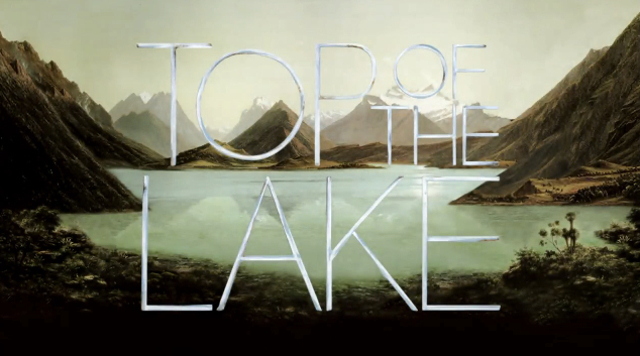Top of the Lake

(Title card via Wikipedia.)
Ryan and I are always on the hunt for shows we can watch together, and “Top of the Lake” fit the bill quite nicely. I’m not usually one for crime or suspense, and you won’t catch me watching shows like “The Walking Dead.” I typically shy away from stories of violence and murder, but I love “Call the Midwife” and find the birth scenes each week to be realistic and respectful. I’ll take babies over zombies any day, I guess.
I’d read about “Top of the Lake” in various places and wasn’t quite sure what to expect, but we decided to give it a try on Netflix. The show is actually a mini-series of seven episodes, and no further seasons are planned. Jane Campion, the writer and director of The Piano, created this New Zealand-based series that features Elisabeth Moss (“Mad Men’s” Peggy Olson) in the main role as Detective Robin Griffin, who is visiting her sick mother in her old hometown when she’s asked to work on a case involving a pregnant twelve-year-old. What Moss’ character uncovers is shocking, to say the least, and she is warned by a local spiritual leader, played by Holly Hunter, that the investigation will bring Griffin to her knees.
That advice proves true, and what follows is a series of discoveries that reveal a history of long-established rape culture in the small lakeside town. Moss’ character is not exempt from the unspoken acts that occur there, and we soon learn of a terrible event in her past that shapes the process of the investigation and her connection to the missing girl.
In many ways, “Top of the Lake” is similar to Stieg Larsson’s The Girl with a Dragon Tattoo series, which Campion cites as an influence. I watched the original Swedish version, three films in all, and haven’t seen the American version. I also tried reading the books and couldn’t stomach the violence, though I understand its importance in explaining crimes that Larsson was trying to expose. “Top of the Lake” conveys a similar message, I think, and while I was shocked at the old boy mindset of this New Zealand town, I was incredibly impressed with Campion’s creation of a strong female lead. Moss’ portrayal of the police detective is fearless and determined, almost to a fault, but she’s also vulnerable and still reeling from the experiences of her past. She alone can save the missing girl and expose the truth within the town, and that’s what appeals to me most about this story.
“Top of the Lake” doesn’t end with a nice and simple resolution, and I felt both horrified and intrigued by the questions left unanswered. That’s why I’m watching it again right now with the subtitles, which help to capture the nuances of the New Zealand accent and explain the things I missed the first time around. Campion lets viewers come to our own conclusions about a few key points, and in the end, it makes for really smart television.
A few articles that I found interesting about “Top of the Lake” include this interview with Jane Campion, this piece about rape culture within the show, and this post about Moss’ role in the series. And my mom just reminded me of this true story about Pitcairn Island, the home of the descendants of the Bounty, where something eerily similar to “Top of the Lake” actually took place for many years. I’m not certain if Campion intended her show as a commentary on this situation, but given the circumstances, it seems quite likely.
If you’ve seen “Top of the Lake,” I’m curious to hear what you thought of it.

Reading about Pitcairn made me think of the Goler clan in Nova Scotia. Crazy how these things happen all over.
I had to google the Goler clan, but what a sad story. It’s also similar to the Warren Jeffs case here. Seems like it happens sometimes in groups that are isolated from the rest of society.